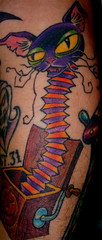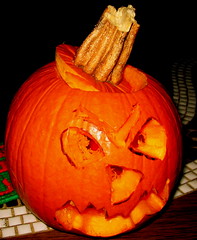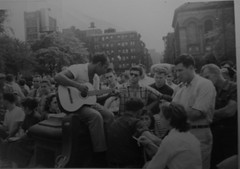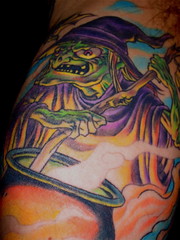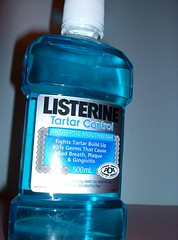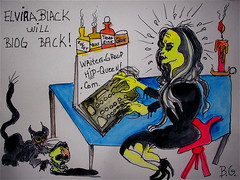Ah, what Schmirnoff hath wrought!
Punked again! No outing to the Botanical Gardens yesterday to see the Haunted Halloween walk. However--thanks to my web research (and it wasn't easy) I located the address of a liquor store in Bronx's Little Italy that is open on Sundays. Rather a shameful accomplishment, but I can be the queen of enabling when I put my mind to it. Seems like BG is determined to make this his lost birthday weekend.
After 14 months in AA, BG went "out" one day back in Jan. or Feb. We'd been attending meetings together, even though I'm not an alchie, but there was a time when I was really throwing them back, and I do like my herb.
BG doesn't do anything by halves, so when he was in AA, he strived to be a perfect little member. As I've detailed elsewhere,he threw himself into the program with a vengeance. We didn't go every day, but probably at least 5 times a week. We also developed a healthy routine--walking at least an hour every day and doing things in the Bronx and the "city."
As for me, after awhile I too started participating and getting to like the AA members from our Bronx groups. Yes, most of them had their quirks and then some, and could be annoying, but I started to come out of the shell I'd crawled into and get a little more social and comfortable around this group of people. Many of them were really warm and caring and friendly, and I could see with my own eyes how much AA had helped them. Quite a few had quit for years; even decades, and literally turned their lives around.
But BG, I think, got himself too far into it. We'd gone to Manhattan meetings before, but early on we perused the AA directory and found some meetings near his place in the Bronx as well.
So we began going to one Bronx group on weekdays, alternating with the downtown Manhattan group in the city. The Bronx group was very nice, but they had no Sunday meeting, so one day we headed over to another meeting that met only on Sundays.
This group, which maybe 10 years ago had been filled to capacity and was actually the oldest AA group in the Bronx, was struggling along now with only a handful of members. Others would come, but there weren't a lot of regulars, and the members had become rather lacksadaisical. There was an 80 year old man who later became BG's sponsor, and for years, he had been coming in early each week to the church where the meeting was held and setting up--sweeping, bringing in the folding tables which were heavy and awkward, setting out the iiterature, putting out the coffee and the cookies. He did the same at the weekday meetings as well. No one thought to help him, and no one seemed to even know what was involved.
When BG and I walked through those doors, the other old timers did the hard sell. By the second meeting, a woman I'll call B with about 19 years of sobriety asked us if we wanted to make this our home group. She had us write down our names, addresses, and numbers, saying "we're anonymous--except among ourselves." Looking back, this should have raised a red flag--there was no good reason for having to give all this info to another AA.
Soon this same woman asked us if we could help J,, the 80 year old guy, set up each week. I think it was less out of concern for J and more about the fact that if J ever got sick or passed away, they'd lose their workhorse. As it was, their 12 steps and 12 traditions banners were so old and ripped up that you couldn't even read the 12th step. BG soon decided that not only was this discouraging for a newcomer, but someone might actually want to see what the 12th step said, so one day we went into the city and hunted down the AA central office and bought new banners.
The more BG got into it, the more "service" he did. In addition to coming in an hour and a half early to help J, BG also insisted on bringing cookies and cake and hot chocolate each week--which we paid for--brewing real coffee instead of instant, and even getting a little hot pot for those who preferred tea. We soon became the designated cake buyers for anniversaries as well.
The thing that really disturbed us is that although every other member's AA anniversary was written down and planned for and celebrated with speakers and a cake and fanfare, when J's anniversary came around no one "knew" about it. We went out and got him a cake ourselves. In retrospect, it seemed pretty reprehensible that they would forsake the only person who was keeping the meetings going every week.
Then, at the meeting in the city, BG was asked if he could take over a weekly commitment and chair on Fridays. When his term ran up, he volunteered for another. But the Manhattan meeting, although it was multicultural and very well attended, had a lot of younger people we soon dubbed "white whiners," because they kvetched about seemingly trivial things despite typically having an immensely more privileged background than the Bronx members. Here, as in the Bronx, there were a few people who got under BG's skin in a very big way.
He'd tried to squelch his resentments, as AAers were supposed to do, and take a moral inventory of those he had wronged and plan to make amends to them. But in BG's case, he started to get resentments over his fellow AA's, and despite praying on his knees (yes!) twice a day for those he didn't like, this just didn't work. He wound up being super nice in the meetings, and very cranky with me. Plus, he really didn't have many amends to make--others who had wronged him over the years should have been making amends to him. And there were always those old timers who would "volunteer" to tell him how to do his program.
So one Friday, we came into the city as usual so BG could chair his meeting. Suddenly, he declared that he wasn't going. I pleaded with him--saying he'd made the commitment and shouldn't break down and go "out" after staving off the bottle for over a year--but when BG makes up his mind, there's no talking to him.
So he went out, and I of course, did too.
The results were mixed. At first, we both got into quite a rut. But eventually, BG would drink for a day or two, then stay sober for awhile--sometimes a long while . And it did seem as if he was better able to "handle" it--he wasn't drinking nearly as heavily as he once had, and instead of moping around, he eventually forced himself to get up on morning after, work out at the gym, and walk over to the Botanical Gardens--hangover or no.
As I said, BG is not the kind of AAer who had a lot of character defects to overcome. He'd never ripped anyone off--if he didn't have the money, he just didn't drink or use. Arguable, the only person he really hurt was himself.
One time about 2 years ago, before we started going to AA, BG was very drunk and lost his balance and fell backwards onto his weights. He wound up with a broken coccyx bone which took quite awhile to heal. It could have been much worse, though.
Lately, the drinking episodes have been more benign for the most part. At some point in the evening, BG may get restless and decide to call family members drunk. The thing is, when BG is drunk he often dominates the conversation completely, or turns the stereo up very loud and sings into the phone which makes a two-way conversation very difficult. And sometimes he (or we) will get impulsive and make stupid plans--like the time we decided to book a weekend in Montauk in the middle of winter to party and we both wound up with the flu. Although our room overlooked the ocean, we never even got to walk down to the beach.
Anyway, yesterday, while BG was out hunting down a new bottle, one of his tattoo guys called to see if BG wanted to get a Halloween tattoo for his birthday. I gave BG the message, and he declined--he'd just gotten a tattoo recently from another guy who's better anyway.
But later that night, I had to talk him out of calling the guy and setting up an appointment today to get a tat. I said, you'll regret it in the morning--when you're hung over, the last thing you're going to want to do is shlep into the city and sit there getting needles inserted in your skin. He finally listened.
The usual routine with BG is at the end of the evening, just before he eats, he likes to take out his guitar and sometimes his harmonica and play a few tunes. He's always loved Dylan, so he plays a lot of that. He's quite good, but I don't much like Dylan and didn't always feel in the mood to listen. But one day I brought over my viola, which I hadn't played in years. After a little practice, I was able to play along with BG quite nicely, and that was more fun for both of us.
Anyway, last night BG was at the wobbly stage and decided to get out his guitar. He has a beautiful Washburn that he bought ages ago, and it's still in mint condition. He has another cheap guitar that a friend bought and later gave him. So I suggested that he use the cheap guitar so he wouldn't risk damaging his good one.
He went into the bedroom to get it, and suddenly there was a crash. In his drunken state, he'd knocked over and broken the table lamp--for the second time in the past month.
He was very upset about this, but I for one was grateful that it was only the lamp and not his guitar or, even worse, his back that got broken this time. But now he's very remorseful and will probably shlep out and get a new one today, hangover be damned.
Another factor in the mix is that BG's mom, who is very religious, can tell when BG's been drinking and chastizes him when she calls after he's had a "few." . "BG," she'll say, "you're a drunkard. You need to get some help, my dear. If you don't want to go to AA, talk to a priest." (Oh, yeah. Like that'll happen). As it is, she constantly sends BG religious literature, books, videotapes, and CD's, and does a lot of sermonizing in her letters. I love BG's parents, but his mom is pretty out there.
So I don't know what we'll be doing today--either BG will stay in bed and rest and watch TV, or we'll party again. We'd planned to go into the city, but I don't know that this will happen. So basically, all the Halloween birthday plans I made have gone by the wayside. But we did have some laughs.
Yes, alcohol can be very dangerous. People get behind the wheel and kill innocent people; some steal or beg, lose their jobs, wreck their marriages, wind up in the loony bin, or shoot their families. My feeling is that pot is much more benign--you're generally too mellowed out to get violent; there's no hangover; and the worst that will probably occur is you'll eat too much. But of course, anything done to excess can be harmful, and BG doesn't like to drink without smoking, and vice versa.
As for me, ever since we quit AA, I've become a vegetable. I got Herman, my trusty Mac Powerbook, back in Feb, and instead of going out with BG for walks like I used to, I blog and roam the internet obsessively and smoke cigs incessantly. Plus, I'm not eating right. This can't go on--I'm no kid anymore and I'm putting my health at risk. Plus which, mental illness and substance abuse aren't the best combo to pursue to excess. So I think we both have some things to work on.
In any case, since I have no cool pix of our Halloween outings, here's another bitchin' tat BG got awile back. If you look at the Jack in the Box box, you can see that there's a jack o lantern carved into the "wood grain," thus making it an official Halloween tattoo. This is one of my faves.
So, should BG take his mom's advice and see a priest, get back on his knees, and start praying again? Anyone else think pot is the lesser of the two evils? Have any partying tales to tell? Any AA horror stories or positive testimonials about the fellowship? Any "character defects" you'd like to get off your chest? I open the floor up to you.
